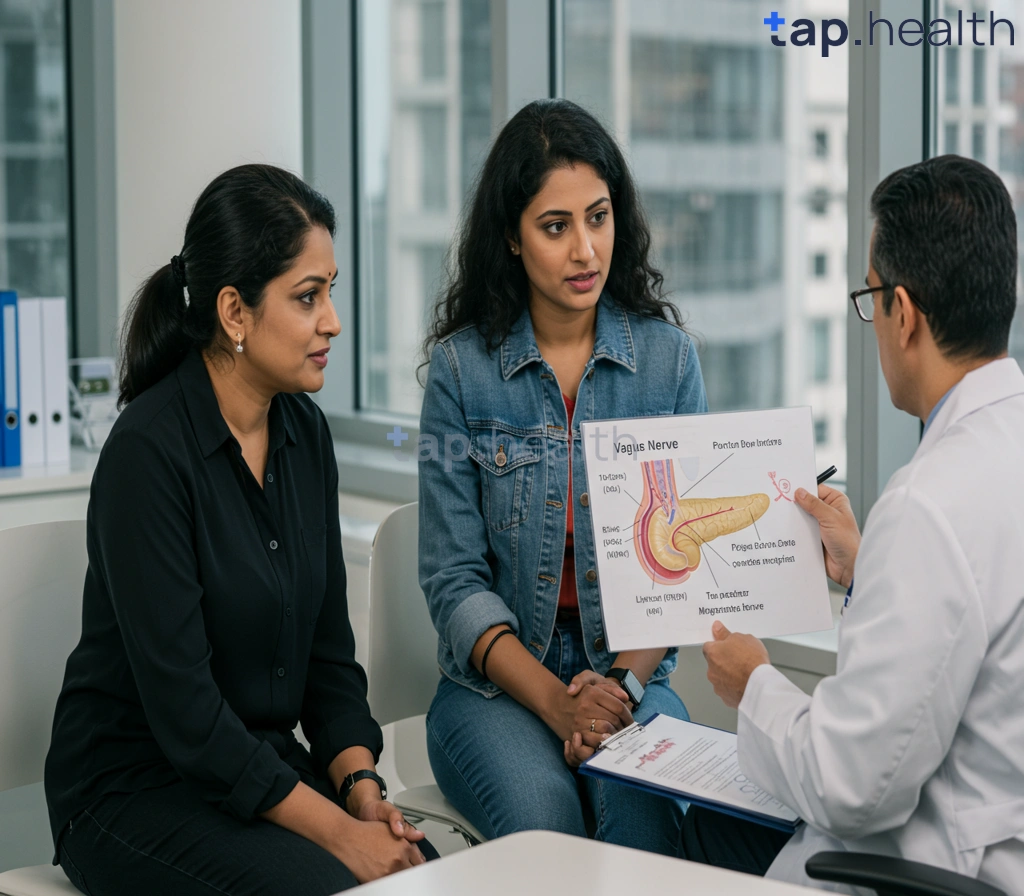Table of Contents
- Understanding the Vagus Nerve: A Key to Diabetes Management?
- Vagus Nerve Stimulation: Can It Improve Blood Sugar Control?
- The Gut-Brain Connection: How Your Vagus Nerve Impacts Diabetes
- Managing Diabetes Naturally: Exploring the Role of the Vagus Nerve
- Improve Your Diabetes Management with Vagus Nerve Techniques
- Frequently Asked Questions
- References
Ever wonder how your body’s internal communication system impacts your health, especially when managing a condition like diabetes? It’s more complex than you might think! This blog post dives into Understanding the Vagus Nerve and its Role in Diabetes Management. We’ll explore the fascinating connection between this crucial nerve, often called the “wandering nerve,” and your blood sugar control. Learning about the vagus nerve can empower you with new strategies for better diabetes management, improving your overall well-being. Let’s unlock the secrets to harnessing its power!
Understanding the Vagus Nerve: A Key to Diabetes Management?
Diabetes affects a significant portion of the global population, with 61% of those diagnosed between the ages of 20 and 64, and a substantial 39% aged 65 and above. In India and tropical countries, where diabetes prevalence is high, understanding effective management strategies is crucial. This includes exploring less conventional avenues, such as the role of the vagus nerve.
The Vagus Nerve and its Influence on Blood Sugar
The vagus nerve, the longest cranial nerve, plays a significant role in regulating various bodily functions, including blood sugar levels. It’s part of the parasympathetic nervous system, responsible for the “rest and digest” response. A healthy vagus nerve can help improve insulin sensitivity and reduce inflammation, both vital factors in diabetes management. Stimulating this nerve, through techniques like deep breathing exercises or mindfulness practices, could potentially help regulate blood glucose levels.
Practical Steps for Vagus Nerve Stimulation
For individuals in India and tropical countries, incorporating easily accessible methods to stimulate the vagus nerve can complement existing diabetes management plans. Simple techniques such as yoga, meditation, and even singing can be beneficial. These practices are widely accessible and culturally relevant across many regions, making them ideal for integration into daily routines. Remember to always consult your doctor before making significant changes to your diabetes management plan.
Taking Charge of Your Diabetes
While vagus nerve stimulation isn’t a standalone cure for diabetes, it offers a promising avenue for improving overall health and potentially assisting in blood sugar regulation. By incorporating simple, accessible techniques into your daily life, you can take a more proactive role in managing your diabetes and improving your overall well-being. Talk to your healthcare provider about how vagus nerve stimulation might complement your existing treatment plan. For more established methods, you might find 10 Proven Tips for Effective Diabetes Management helpful. And if you’re facing the specific challenges of managing diabetes as you age, Managing Diabetes as You Age: Challenges and Solutions offers valuable insights.
Vagus Nerve Stimulation: Can It Improve Blood Sugar Control?
Managing blood sugar levels effectively is crucial for individuals with diabetes, particularly in hot and humid climates prevalent in many Indian and tropical countries where lifestyle factors can significantly impact glycemic control. Maintaining pre-meal blood sugar levels between 80–130 mg/dL and post-meal levels below 180 mg/dL is the ideal target. Achieving these goals often requires a multifaceted approach, and emerging research highlights the potential role of the vagus nerve. Understanding what constitutes healthy Blood Sugar Levels is the first step.
Understanding the Vagus Nerve’s Influence
The vagus nerve, a key component of the parasympathetic nervous system, plays a vital role in regulating various bodily functions, including digestion and insulin release. Stimulating the vagus nerve can potentially improve insulin sensitivity and help regulate blood glucose levels. This can be achieved through various methods, including lifestyle modifications.
Practical Steps for Vagus Nerve Stimulation
Deep breathing exercises and yoga, practices deeply rooted in Indian culture and widely practiced across tropical regions, are effective ways to stimulate the vagus nerve naturally. These techniques promote relaxation, reducing stress which is a known contributor to high blood sugar. Regular physical activity, another crucial element of diabetes management, also indirectly stimulates the vagus nerve, contributing to improved metabolic function. Furthermore, incorporating mindfulness techniques can help manage stress and improve overall well-being, indirectly supporting blood sugar regulation. For those experiencing morning blood sugar spikes, understanding why blood sugar spikes in the morning and how to manage them can be particularly helpful.
Seeking Expert Advice
While the connection between vagus nerve stimulation and diabetes management is promising, it’s crucial to consult with a healthcare professional, particularly a diabetologist, before making any significant changes to your treatment plan. They can assess your individual needs and guide you on appropriate strategies for managing your diabetes effectively within the context of your specific environment and lifestyle in India or other tropical regions. Remember, consistent monitoring of blood sugar levels, along with a balanced diet and regular exercise, remain fundamental to effective diabetes management.
The Gut-Brain Connection: How Your Vagus Nerve Impacts Diabetes
The intricate link between your gut and brain, mediated by the vagus nerve, plays a surprisingly significant role in managing diabetes, particularly prevalent in Indian and tropical countries. This crucial nerve acts as a communication highway, transmitting signals between your digestive system and your brain, influencing everything from insulin sensitivity to blood sugar regulation. Understanding this connection is key to holistic diabetes management, especially considering the high incidence of diabetes-related complications.
Impact on Blood Sugar Control
A healthy vagus nerve supports optimal insulin function. When the vagus nerve is functioning well, it can help improve insulin sensitivity, meaning your body uses insulin more effectively to process glucose. Conversely, vagus nerve dysfunction can lead to impaired glucose tolerance and increased blood sugar levels. This is particularly relevant given that nearly 30% of people with diabetes develop diabetic nephropathy (kidney disease), highlighting the importance of overall health management.
Practical Steps for Vagus Nerve Support
Incorporating practices that support vagus nerve health can be beneficial for individuals with diabetes in India and other tropical regions. Simple lifestyle changes can make a difference: deep, slow breathing exercises, regular physical activity, and a diet rich in fiber and prebiotics can help stimulate vagus nerve activity. Furthermore, incorporating stress-reduction techniques like yoga and meditation can also contribute to improved vagus nerve function and overall well-being. Prioritizing these aspects alongside medication and regular check-ups is crucial for effective diabetes management. A healthy diet plays a crucial role, and understanding What’s the Connection Between Gut Health and Your Diet? can be incredibly beneficial.
Taking Control of Your Health
By focusing on optimizing vagus nerve health through lifestyle modifications, individuals with diabetes in India and across tropical regions can potentially improve their blood sugar control and reduce the risk of complications like diabetic nephropathy. Consult your healthcare provider to discuss incorporating these strategies into your personalized diabetes management plan. Remember, proactive steps towards a healthier lifestyle can significantly impact your overall well-being. This is especially important given the strong link between Understanding the Link Between Diabetes and Obesity.
Managing Diabetes Naturally: Exploring the Role of the Vagus Nerve
Did you know that people with diabetes are 70% more likely to develop sleep disorders such as sleep apnea? This shows how deeply diabetes affects overall health. One important yet often overlooked factor in this connection is the vagus nerve—a key part of the body’s parasympathetic nervous system.
Often called the “wandering nerve”, the vagus nerve influences many vital functions, including digestion, heart rate, stress response, and blood sugar regulation. Understanding and supporting this nerve can play a meaningful role in managing diabetes naturally.
How to Stimulate the Vagus Nerve for Diabetes Care
The good news is that there are simple, natural ways to keep your vagus nerve active and healthy:
-
Deep breathing: Helps calm the body, reduce stress, and stabilize blood sugar levels.
-
Yoga and meditation: Practices like Hatha or restorative yoga boost relaxation and improve vagal tone.
-
Balanced diet: Whole grains, vegetables, and fruits support overall health.
-
Spices with benefits: In countries like India, spices such as turmeric and ginger (known for their anti-inflammatory properties) can indirectly support nerve and metabolic health.
-
Regular activity: Daily exercise improves both vagal health and blood sugar control.
Practical Steps You Can Take
-
Begin with 10 minutes of deep breathing each day, then slowly increase.
-
Try adding gentle yoga or meditation to your routine.
-
Stay consistent with healthy eating and moderate exercise.
-
Always check with your doctor or healthcare provider before making big changes, especially if you already have health conditions.
By adopting these simple practices, you can support your vagus nerve, improve blood sugar control, and feel healthier overall.
Improve Your Diabetes Management with Vagus Nerve Techniques
Understanding the Vagus Nerve’s Impact on Diabetes
Diabetes and hypertension frequently coexist, with over 60% of individuals with diabetes in India also experiencing high blood pressure, as highlighted by the International Diabetes Federation (IDF India). This underscores the importance of holistic diabetes management strategies. The vagus nerve, a crucial component of the parasympathetic nervous system, plays a significant role in regulating blood sugar levels and blood pressure. Stimulating this nerve can offer considerable benefits.
Practical Techniques for Vagus Nerve Stimulation
Fortunately, you don’t need complex medical procedures to stimulate your vagus nerve. Simple techniques can be incorporated into your daily routine. Deep, slow breathing exercises, such as diaphragmatic breathing, activate the vagus nerve, promoting relaxation and potentially improving insulin sensitivity. Regular physical activity, particularly yoga and tai chi, are also effective. These practices not only help manage blood sugar but also contribute to overall well-being, crucial for individuals managing diabetes, especially in hot and humid tropical climates. Managing stress is also vital, and you can learn more about Effective Stress Management Tips for Better Diabetes Control.
Harnessing the Power of the Vagus Nerve in India and Beyond
Incorporating these techniques into your diabetes management plan can significantly improve your health outcomes. For individuals in India and other tropical countries, where the prevalence of diabetes and hypertension is high, focusing on vagus nerve stimulation offers a natural and accessible approach to better health. Remember to consult your doctor before starting any new health regimen, particularly if you have existing health conditions. Prioritizing a healthy lifestyle encompassing proper diet, exercise, and stress management, alongside vagus nerve stimulation techniques, can significantly improve your quality of life. Furthermore, exploring How Can New Technological Advances Improve Diabetes Lifestyle? can provide additional tools for managing your condition.
Frequently Asked Questions on Understanding the Vagus Nerve and its Role in Diabetes Management
Q1. What is the vagus nerve and how does it relate to diabetes?
The vagus nerve is part of your parasympathetic nervous system. It plays a role in regulating blood sugar and insulin sensitivity. Stimulating it might help improve blood glucose control in people with diabetes.
Q2. What are some ways to stimulate the vagus nerve?
Techniques like deep breathing exercises, yoga, meditation, and mindful practices can help stimulate the vagus nerve. These are accessible methods you can incorporate into your daily routine.
Q3. Can vagus nerve stimulation cure diabetes?
No, vagus nerve stimulation is not a cure for diabetes. However, it shows promise as a complementary approach to help manage blood sugar levels and improve overall health. It’s most effective when combined with conventional treatments.
Q4. How can I safely start using these techniques to stimulate my vagus nerve?
It’s crucial to consult your doctor before making significant changes to your diabetes management plan. They can help you determine if these techniques are suitable for you and guide you on how to safely incorporate them.
Q5. What is the overall approach to managing diabetes using vagus nerve stimulation?
A holistic approach is best. Combine conventional diabetes treatments (medication, diet) with lifestyle modifications that support vagal nerve health, such as regular exercise, stress management, and the techniques mentioned above.
References
- A Practical Guide to Integrated Type 2 Diabetes Care: https://www.hse.ie/eng/services/list/2/primarycare/east-coast-diabetes-service/management-of-type-2-diabetes/diabetes-and-pregnancy/icgp-guide-to-integrated-type-2.pdf
- Diabetes Mellitus: Understanding the Disease, Its Diagnosis, and Management Strategies in Present Scenario: https://www.ajol.info/index.php/ajbr/article/view/283152/266731



